The Vietnam War, which spanned from 1955 to 1975, was tumultuous for many countries, including Australia. During this time, Australian politics and society underwent significant changes, with public opinion and government policies being shaped by various events, protests, and decisions. This blog post will delve into the critical milestones that marked Australia's involvement in the Vietnam War and the subsequent withdrawal of its troops, highlighting these events’ impact on the country's politics and the broader anti-war movement.
Life & Times
On 10 March 1971, Sir William McMahon replaced John Gorton as Prime Minister of Australia following a dramatic party room ballot. The vote resulted in a 33:33 tie, leading Gorton to vote against himself. This marked the beginning of a new era in Australian politics, as McMahon announced significant changes in the country's involvement in the Vietnam War. John Gorton's decision to effectively vote himself out of office came as a surprise to many. However, Cabinet leaks had marred his tenure, which he later criticised in a published article. Following his removal, Gorton stood for and won the Deputy Party Leader position, as McMahon beat Billy Snedden for the Liberal leadership.
On 30 March, Prime Minister McMahon swiftly announced additional reductions to Australian forces in South Vietnam. This decisive move led to the withdrawal of various military components, including a tank squadron of about 650 men, a Royal Australian Air Force (RAAF) Canberra bomber squadron with 280 personnel, and several Caribou transport aircraft accompanied by approximately 44 men. Furthermore, around 45 Royal Australian Navy (RAN) personnel serving with the United States Assault Helicopter Company and a six-member RAN Clearance Diving Team responsible for underwater explosive clearance were also withdrawn. These significant cuts marked a shift in Australia's involvement in the Vietnam War and highlighted McMahon's determination to reduce the country's military presence in the region.
On 30 June, approximately 110,000 people participated in anti-war demonstrations in state capitals throughout Australia, marking the third and final large-scale rally organised by the Vietnam Moratorium Campaigns. These campaigns emerged from a conference held in Canberra in November 1969 to plan a series of protests inspired by the American Moratorium model. The Vietnam Moratorium movement, which called for the immediate withdrawal of Australian troops from Vietnam and repealing the National Service Act, mobilised hundreds of thousands of people and garnered significant publicity. This mass movement, distinguished by its non-violent philosophy, shaped the Australian government's stance on the Vietnam War.
On 4 July, events such as the ball at Paddington Town Hall in Sydney, which promoted independence from American influence and involvement in the war, further contributed to the growing public opposition to Australia's engagement in the conflict.
The 1971 South Africa rugby union tour of Australia was a highly controversial six-week tour by the Springboks, which was met with widespread anti-apartheid protests throughout the country. Protesters, primarily led by university students, disrupted several matches and acted defiantly, such as attempting to take down goalposts at the Sydney Cricket Ground. The tour saw around 700 people arrested, ultimately contributing to the cancellation of the cricket tour scheduled for later that summer due to security concerns. The tour is perhaps most infamous for the state of emergency declared in Queensland. Despite the social unrest surrounding the tour, South Africa won the Test Series 3-0 against Australia.
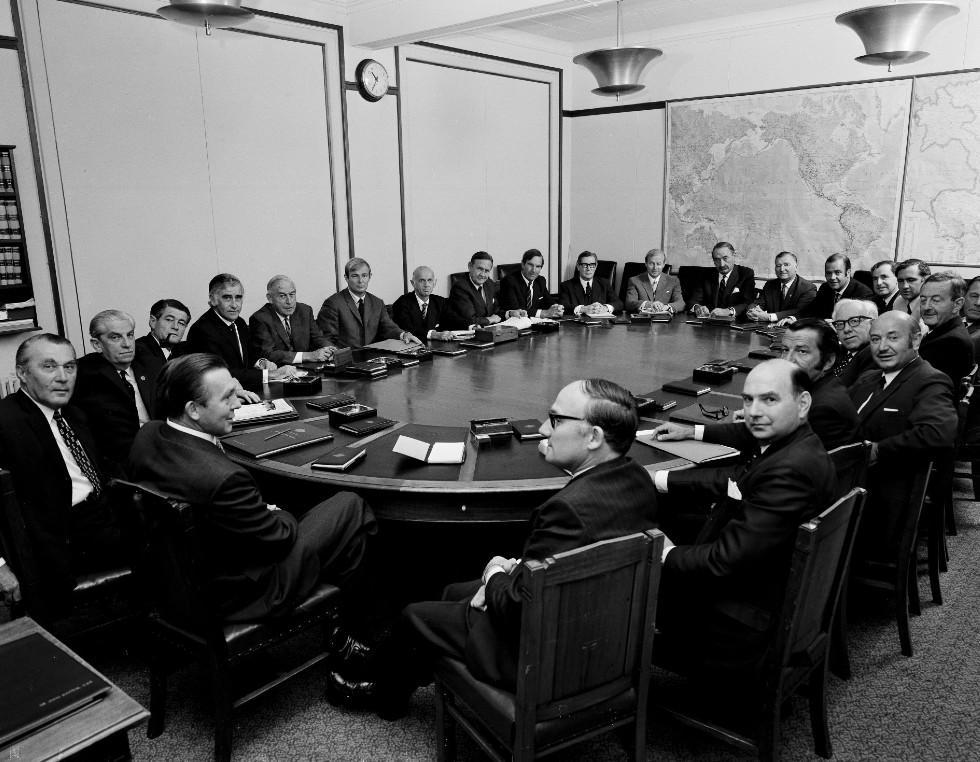
Prime Minister William McMahon's new ministers seated around the Cabinet table in Parliament House. Seated clockwise from left are Senators Cotton and Anderson, Dr AJ Forbes, Billy Snedden, Alan Hulme, Doug Anthony, the Prime Minister, John Gorton, Ian Sinclair, Nigel Bowen, P Nixon, C Barnes, Senator Drake-Brockman, Phillip Lynch, Ralph Hunt, Andrew Peacock, Doug Fairbairn, Leslie Bury, WC Wentworth, Reg Swartz, Don Chipp, Dr Mackay, KMK Cairns and Senator Greenwood, 1971. NAA: A1200, L94982
On 18 August, Australian Prime Minister McMahon declared that most of Australia's combat forces in South Vietnam would be withdrawn by early the following year, with most troops returning home by Christmas. He explained that the initial withdrawal would begin in the next few months, allowing time for the Vietnamese to adjust their force dispositions. Furthermore, McMahon announced a reduction in the national service period from two years to 18 months, resulting in a decrease of 4,000 men in the army. Despite the changes, Australia pledged to increase other forms of aid to South Vietnam, including spending $25 million on civil projects and defence aid, such as military training and equipment, over the next three years.
On 6 October, soldiers of the 3rd Battalion, Royal Australian Regiment (3 RAR) marked the end of their eight-month tour in South Vietnam by helicopter flying onto the troop carrier HMAS Sydney. This significant event signalled the beginning of the withdrawal of Australian forces, as announced by Prime Minister McMahon earlier that year. 3 RAR, the first primary unit to leave the war zone since the withdrawal announcement, would later march through the streets of Adelaide to commemorate their return. With their departure, only one battalion remained stationed at Nui Dat in South Vietnam.
On 2 November, US President Richard Nixon gave Prime Minister McMahon an unqualified endorsement of the Anzus alliance, stating that the United States would honour its commitments under the coalition. He described the alliance as one of America's fundamental pillars in the Pacific.
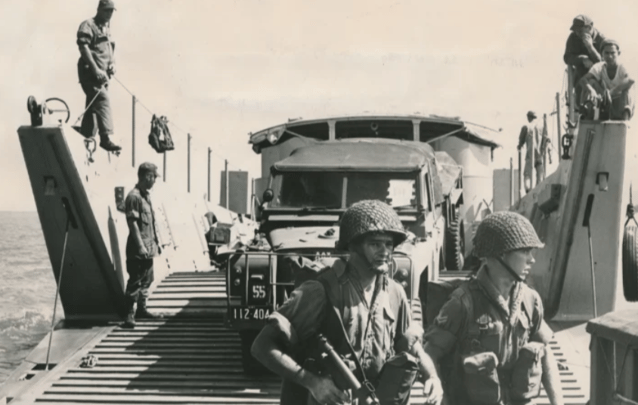
Australian troops and vehicles disembark in Vietnam. Photo by STUART MACGLADRIE, Sydney Morning Herald
In November, Australia and New Zealand announced the withdrawal of their troops from Vietnam, marking the end of their military involvement in the conflict. On 7 November 1971, the 4th Battalion, Royal Australian Regiment (4 RAR), moved from Nui Dat to Vung Tau, effectively ending Australian combat operations in Phuoc Tuy province. After almost six years of active duty in the Phuoc Tuy province, the central Australian unit handed over its base to Vietnamese forces, with the remaining troops focusing on defending their positions. As Defence Minister Mr Fairbairn stated, the Australian forces ceased participating in military operations in Phuoc Tuy province, and up to 300 men were returning to Australia each week. By this point, approximately 44 per cent of the task force, 45 per cent of the vehicles, and many stores had already been brought home. HMAS Sydney also departed Vung Tau, carrying troops, vehicles, and equipment back to Australia. This marked a significant milestone in the gradual withdrawal of foreign forces from the Vietnam War zone.
Sir William McMahon's tenure as Prime Minister of Australia was marked by significant changes in the country's involvement in the Vietnam War. As public opinion shifted and anti-war sentiment grew, McMahon made decisive moves to reduce Australia's military presence in Vietnam. His leadership ultimately contributed to the withdrawal of Australian and New Zealand troops from the conflict, signalling the end of an era in the region's history.
In conclusion, Australia's involvement in the Vietnam War and the subsequent withdrawal of its troops played a crucial role in shaping the nation's political landscape and public opinion. Events such as the dramatic change in leadership, anti-war protests, and decisions to reduce military presence in the region demonstrated the complexities of the conflict and its impact on Australian society. As the country moved towards disengagement from the Vietnam War, the lessons learned during this turbulent period continued to influence and inform Australia's approach to international relations and military involvement in conflicts worldwide.
For more such historical content from the Life and Times of the Vietnam War, check out our other blogs or visit the landing page.
Music of 1971
Amidst the national turmoil, music provided an escape and a unifying force for the public. Chart-toppers like Daddy Cool's Eagle Rock and George Harrison's My Sweet Lord offered solace, while songs such as Olivia Newton-John's Banks of Ohio and Rod Stewart's Maggie May captured the era’s essence.
|
No. |
Song Title |
Artist |
|
1. |
Eagle Rock |
Daddy Cool |
|
2. |
My Sweet Lord |
George Harrison |
|
3. |
The Pushbike Song |
The Mixtures |
|
4. |
Daddy Cool |
Drummond |
|
5. |
L.A. International Airport |
Susan Raye |
|
6. |
I Don't Know How to Love Him |
Helen Reddy |
|
7. |
Knock Three Times |
Tony Orlando & Dawn |
|
8. |
Banks of Ohio |
Olivia Newton-John |
|
9. |
Rose Garden |
Lynn Anderson |
|
10. |
Eleanor Rigby |
Zoot |
|
11. |
Too Young to Be Married |
The Hollies |
|
12. |
Love is a Beautiful Song |
Dave Mills |
|
13. |
Maggie May |
Rod Stewart |
|
14. |
I Think I Love You |
The Partridge Family |
|
15. |
Band Of Gold |
Freda Payne |
Join the Conversation
We're helping Australians of all ages better understand the life and times of our Vietnam Veterans as we commemorate the end of Australia's involvement in the war 50 years ago. We're sharing interesting social bits and pieces from the Vietnam War era to give you a feel of the world back then, but most importantly we're sharing your memories, stories, and pride. Your memories of the Vietnam era; your family growing up in the 1960s and 70s; or stories you have about the life and times of your veteran dad, pop, uncle, or aunt will breathe life into their story. Share your pictures, anecdotes, and memories so others can see our veterans as more than soldiers. We honour, respect and admire, but few know. Help us honour our Veterans.
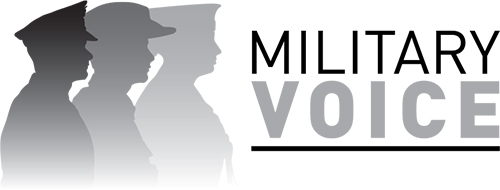



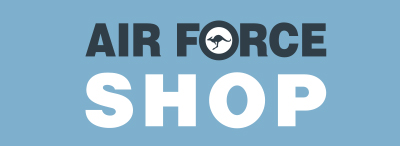
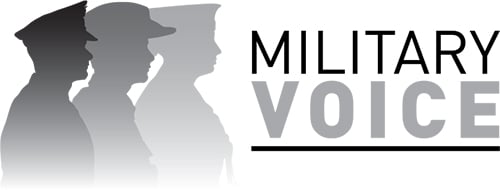
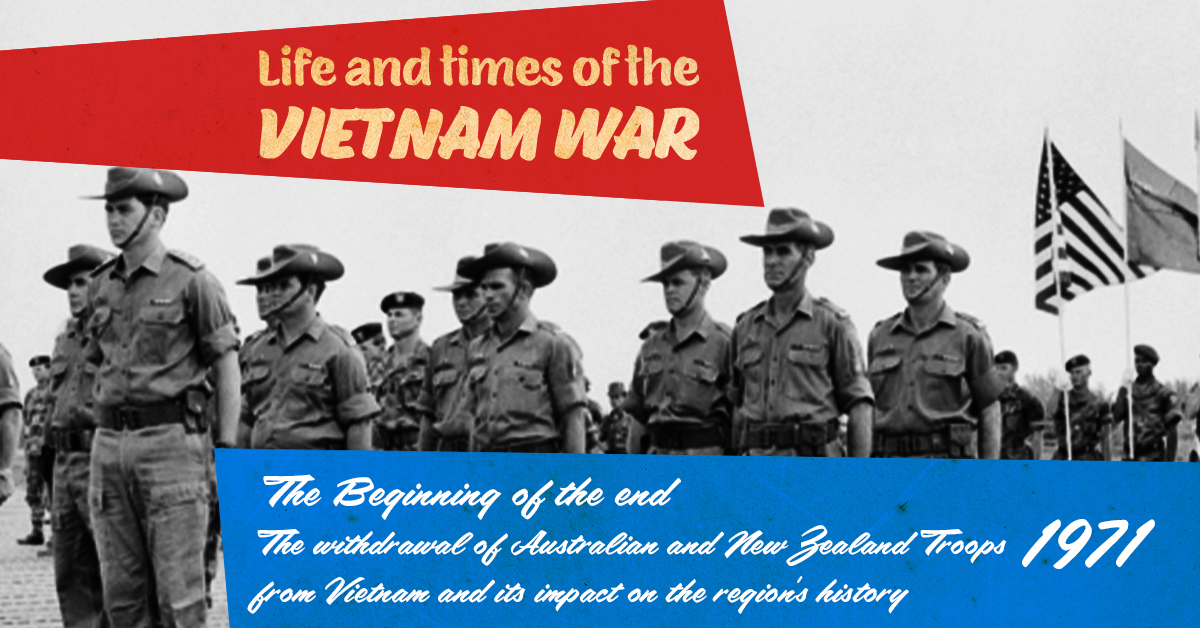
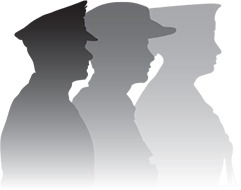
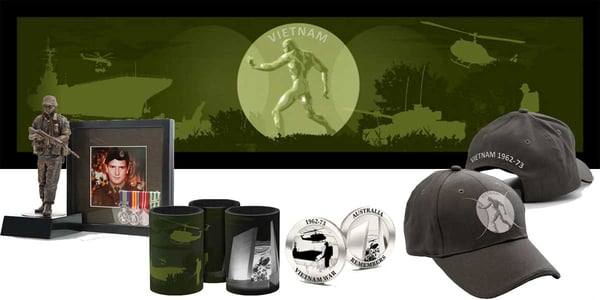
Leave Comment